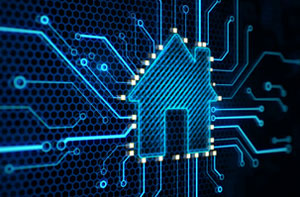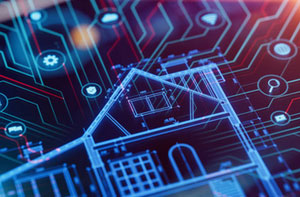Home Automation UK: Home automation refers to the use of technology to control and manage various household systems and devices remotely or automatically. In recent years, it has become increasingly popular as people seek more convenience, security, and efficiency in their daily lives. By integrating smart technologies, homeowners can streamline tasks and make their homes more responsive to their needs. This shift towards automation is part of a broader trend towards the “smart home,” where interconnected devices communicate with each other, making life simpler, safer, and more energy-efficient.
The Rise of Smart Homes:The concept of home automation is not entirely new, but recent advances in technology have made it more accessible and practical. Devices such as smart thermostats, lighting systems, security cameras, and even household appliances can now be controlled from a smartphone or through voice commands. These systems are interconnected via the internet, allowing homeowners to monitor and manage their homes from anywhere in the world. The convenience of being able to adjust settings on the go, such as turning off the lights or adjusting the heating, has made home automation highly attractive to busy individuals and families.

In the past, home automation was largely limited to high-end homes or bespoke installations that required professional expertise. Today, however, the proliferation of smart devices, coupled with more affordable technology, has made home automation attainable for a much wider audience. The development of platforms like Amazon Alexa, Google Home, and Apple HomeKit has further driven this trend, offering users an intuitive interface to control multiple devices seamlessly.
Key Benefits of Home Automation
One of the primary advantages of home automation is the convenience it offers. Everyday tasks can be automated, saving time and effort. For instance, smart lighting systems allow users to programme lights to turn on or off at specific times or in response to certain conditions, such as motion detection. Similarly, smart thermostats can be set to adjust the temperature based on occupancy or weather conditions, ensuring optimal comfort while reducing energy consumption.
Another significant benefit is enhanced security. Home automation systems often include smart cameras, doorbells, alarms, and sensors that can be monitored in real-time from a smartphone. This means that even when away from home, homeowners can receive alerts about any unusual activity, such as someone approaching the front door or entering the property. In some cases, these systems can even automatically alert the authorities, providing peace of mind and a sense of control.
Home automation also contributes to energy efficiency. Smart thermostats, lighting systems, and appliances can be programmed to use energy only when necessary, reducing waste and lowering utility bills. For example, a smart thermostat can be set to reduce heating or cooling when no one is home, then restore the desired temperature just before occupants return. Similarly, smart lighting systems can automatically turn off lights in empty rooms, helping to conserve energy and reduce costs. This energy efficiency not only benefits the homeowner’s finances but also has a positive impact on the environment by lowering energy consumption.
How Home Automation Enhances Security
Security is a major concern for many homeowners, and home automation offers a range of solutions that can significantly improve peace of mind. Smart security systems include devices such as cameras, motion detectors, door and window sensors, and smart locks. These systems can be monitored and controlled remotely, giving homeowners the ability to check in on their property at any time, from anywhere.

Smart cameras, for example, can send real-time video feeds to a homeowner’s smartphone, allowing them to see who is at their door or what is happening inside their home. Some cameras are equipped with two-way audio, enabling the user to speak to someone at the door, even if they are miles away. This feature is particularly useful for dealing with deliveries or unexpected visitors.
Smart locks are another key component of home automation security. These devices allow homeowners to lock and unlock their doors remotely, eliminating the need for traditional keys. In addition, smart locks can be programmed to grant access to specific individuals at certain times, making them ideal for families with children, housekeepers, or other regular visitors. If necessary, access can be revoked or modified instantly, providing greater control over who enters the home.
In the event of suspicious activity, many home automation systems can send instant notifications to the homeowner. If a motion sensor is triggered or a door is opened unexpectedly, the system will alert the homeowner via a text message or an app notification. Some advanced systems can also alert local authorities automatically, ensuring a rapid response to potential threats.
Energy Efficiency and Cost Savings
One of the most appealing aspects of home automation is its potential to save energy and reduce household costs. Smart devices are designed to be energy efficient, helping to reduce unnecessary energy use. For example, smart thermostats can learn a household’s schedule and adjust heating or cooling based on occupancy, ensuring that energy is not wasted when no one is home. This not only reduces energy bills but also contributes to a more sustainable lifestyle.
Smart lighting systems are another way to cut down on energy usage. These systems can be programmed to turn off lights in rooms that are not being used, or even to adjust the brightness based on natural light levels. In addition, many smart lighting systems allow for remote control, meaning homeowners can switch off lights from their phone if they forgot to do so before leaving the house.
Household appliances are also becoming increasingly integrated into home automation systems. Smart washing machines, fridges, and ovens can all be controlled remotely, allowing homeowners to monitor their energy use and ensure that devices are only running when necessary. For example, a smart washing machine can be scheduled to run during off-peak energy hours, reducing electricity costs.
The Future of Home Automation
The future of home automation is likely to see even greater integration between devices, creating homes that are fully responsive to the needs and preferences of their occupants. Voice-activated assistants, such as Amazon Alexa and Google Assistant, are already becoming central hubs for home automation systems, allowing users to control everything from lighting to entertainment with simple voice commands. As artificial intelligence and machine learning technologies continue to develop, home automation systems are expected to become even more intuitive, learning from their users and automatically adjusting settings to suit their preferences.
Moreover, advances in wireless technology, such as 5G, will likely enhance the reliability and speed of home automation systems, making them even more effective and user-friendly. As these technologies become more widespread, it is expected that home automation will become the norm rather than a luxury, transforming the way we live and interact with our homes.
In conclusion, home automation offers numerous benefits, from increased convenience and security to energy savings and cost efficiency. As technology continues to evolve, the possibilities for creating smart homes will only expand, offering homeowners greater control, comfort, and peace of mind in their daily lives.
Home automation services can be provided in these areas and many more: Shafton, Melbourn, Thorpe Hesley, Anston, Finningley, Gobowen, Gamlingay, Barnby Dun, Little Chalfont, Dunscroft, Moorends, Leadgate, Bredbury, Oakengates, Coxhoe, Fenstanton, Burnopfield, Treeton, Pontesbury, Birdwell, Coundon, Uppermill, Church Stretton, Fordham, Oughtibridge, Great Lumley, Mapplewell, Papworth Everard, Linton, Newhey, Broadway, Bar Hill, Craven Arms, Pendlebury, Highley, Little Paxton, Ellesmere, Lanchester, Tottington, Edlington, Longstanton, Bishop's Castle, Bowburn, Kempsey, Somersham, Audenshaw, Fernhill Heath, Grimethorpe, Sprotbrough, Hemingford Grey, Buckden.


